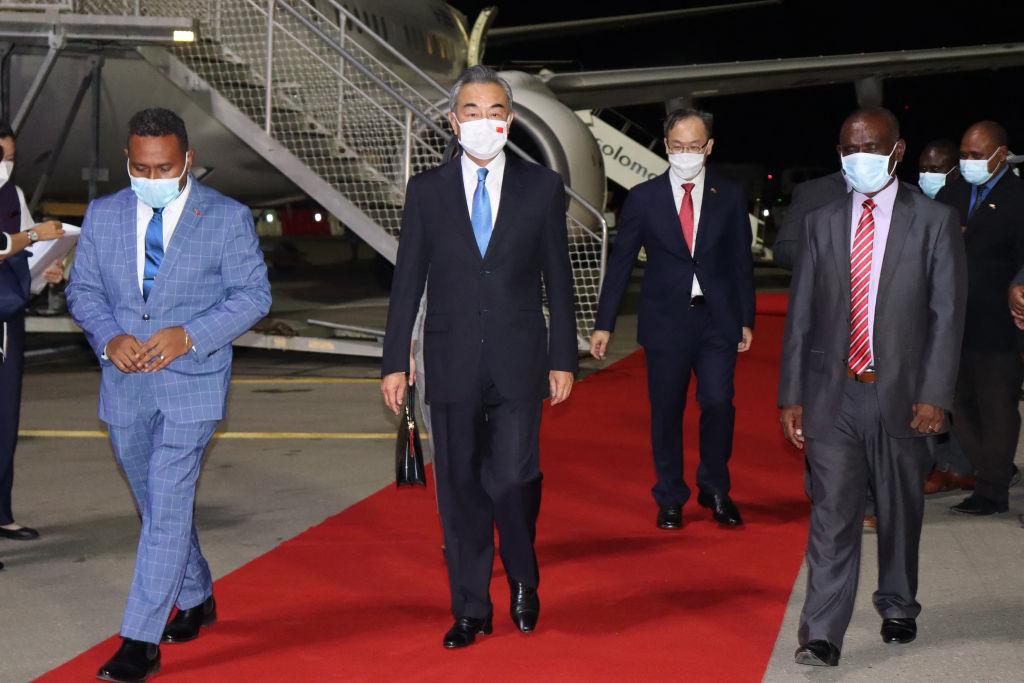
China is seeking a security, policing and communications cooperation deal with 10 Pacific island countries, according to documents seen by Reuters. Chinese Foreign Minister Wang Yi’s whirlwind tour of the Pacific beginning today in Solomon Islands will reach its peak at a 30 May foreign ministers’ meeting in Fiji.
China has pushed a draft communique to the 10 Pacific island countries involved in advance of the meeting. Almost immediately, Federated States of Micronesia President David Panuelo expressed concern about the Chinese Communist Party’s intent.
This pushback is vital for regional stability and the cynicism over China’s intent or motivation is key—why is China doing this and why now? As ASPI’s Executive Director, Justin Bassi recently wrote, China’s ‘end game is to push out US and allied interests, achieve regional hegemony, create vassal states, control access to supply chains and improve its ability to take Taiwan with minimal costs’.
Panuelo also recently wrote to Solomon Islands Prime Minister Manasseh Sogavare urging him to reconsider the potential regional security impacts of a Chinese military presence in Solomon Islands. Panuelo fears this new, broader agreement could increase tensions and spark a new Cold War between China and the West.
According to Reuters, Panuelo pointed out that this was a ‘pre-determined joint communique’. The CCP would like all Pacific island countries to blindly follow the script, but Panuelo is unlikely to be the only Pacific leader to have issues with the agreement.
The challenge for Australia and the region is that we are competing with China’s ‘predatory mercantilism’ which undermines the international rules-based system and directly threatens our interests. Australia, the US, New Zealand and others should back in the Pacific islands, which means pouring sunlight on China’s actions and intent. The draft regional agreement and Wang’s visit are clearly part of a scaled-up effort towards Chinese regional hegemony and influence in critical economic and security sectors.
Some Pacific countries have existing bilateral policing relationships with China, with Fiji’s being the most developed, but a regional agreement such as this would likely aim to take engagement to new heights.
The draft communique reportedly pledges cooperation on data networks, cybersecurity and smart customs systems. This would provide the CCP with opportunities to collect biodata and conduct mass surveillance. Some of this may be used for policing, but it will also serve other purposes for the CCP. Increased transparency, including leaks, of China’s human rights abuses of religious minorities in Xinjiang and the harsh crackdowns of entire cities during the Covid-19 pandemic should be a deep concern to all in our region.
In the lead up to the APEC leaders’ summit in Port Moresby in 2018, Papua New Guinea accepted about 200 gifted surveillance cameras and a Chinese EXIM bank loan for a Huawei-built data centre. Although proving too costly to maintain, this data centre was later revealed to be highly vulnerable to remote access and the information it collected would have been readily accessible by the CCP.
China’s proposed action plan also reportedly includes the provision of forensic laboratories. China has previously gifted digital forensic labs across Southeast Asia, including to Vietnam. ASPI’s Mapping China’s Tech Giants project shows that these labs were developed in cooperation with Meiya Pico—a CCP-affiliated digital forensics and information-security company that has been linked to the surveillance software MFSocket scandal.
The CCP could use some of this surveillance data for other malign purposes that do not serve the interests of Pacific island countries. The risks that mass surveillance and monitoring technologies can pose to developing countries have already been highlighted in numerous cases across Africa.
China’s extraditions in Fiji in 2017 and Vanuatu in 2019 should also serve as a reminder that Pacific sovereignty isn’t one of Beijing’s concerns when tackling crime abroad. Both events raised concerns over China’s policing and extradition practices and questioned Fiji’s and Vanuatu’s abilities to uphold the law in their own countries.
Preventing the opportunity for surveillance activities like those identified above is part of the reason Australia has already invested enormous amounts of money into outbidding China and blocking its access to critical digital infrastructure in the region.
Mass surveillance is against Australia’s values and interests, at home and abroad. Australia’s new Prime Minister Anthony Albanese has made it clear that ‘Australia should always stand up for [its] values’.
These agreements and the potential for a Chinese military presence are not just against Australia’s interests but the entire Pacific’s, so more leaders need to make their voices heard. They also need to know they will have Australia’s ongoing support to meet their development, security and training needs.
Australia’s new government couldn’t be clearer with its intentions to listen to the Pacific and build even further on the already significant Pacific step-up investment.
Foreign Minister Penny Wong said on her first day in her new role that Australia wants to ‘help build a stronger Pacific family’ and ‘bring new energy and more resources to the Pacific’.
This includes plans to establish a new Australia Pacific defence school that will increase training programs for select Pacific countries’ defence and security forces.
Focusing on our Pacific relationships first and foremost is essential through practical support and investment in critical sectors that will drive development and security. But more money is not the silver bullet. To outcompete China without using its tactics of bribery, bullying and breaching of sovereignty, Australia needs to push back, and hard, against actions that are not in our interest and support the Pacific voices that share our concerns. This requires resources backed in by influence and power in the region, ensuring transparency of malign behaviour and a mobilisation of like-minded partnerships and alliances.